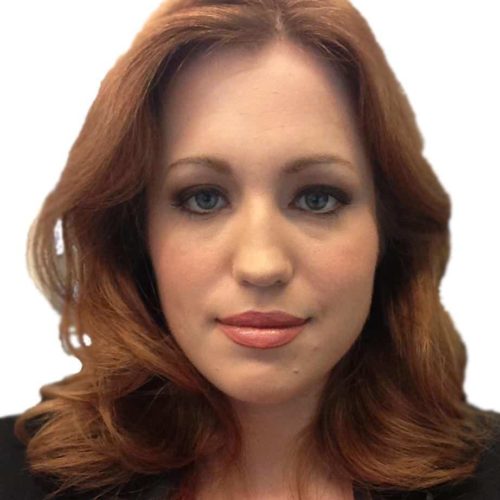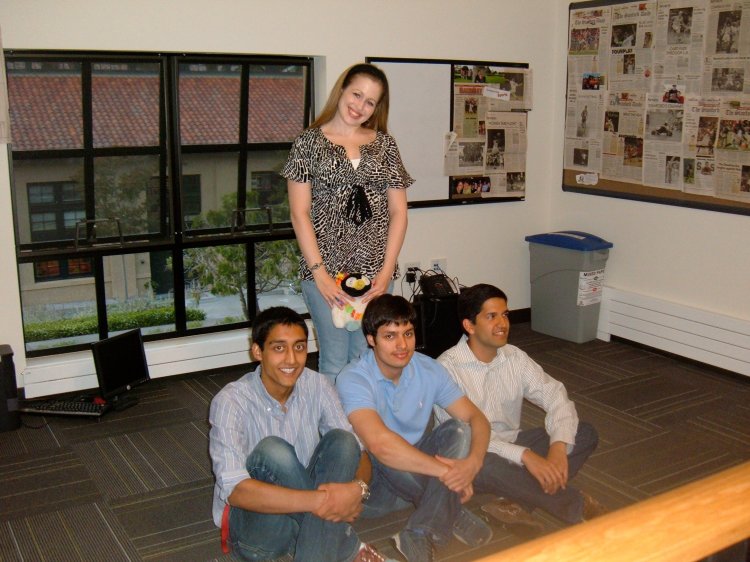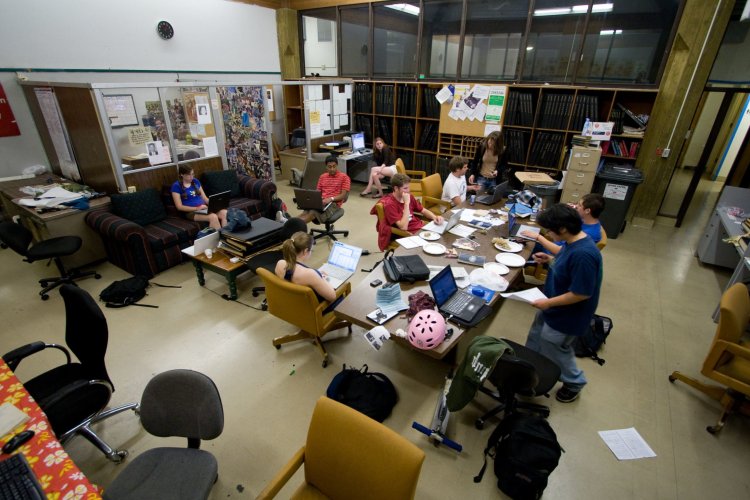Alumni Spotlight: Andrea Fuller ’09
Welcome back to The Daily’s Alumni Q&A Spotlight series! Join us as we sit down and catch up with Daily alums on what they’ve been up to since their newsroom days, and reflect on their time at the paper and the role it played in their lives + careers.

This month, we’re joined by Andrea Fuller ’09, a data journalist for The Wall Street Journal and adjunct professor at Columbia University. Previously, she worked at Gannett Digital, The Center for Public Integrity, and The Chronicle of Higher Education. At The Daily, she served as the managing editor of news. Read on for our conversation on all this and more.
This interview has been condensed and edited for clarity.
The Stanford Daily (TSD): Can you tell us about how you got into journalism and how you found your way to The Daily? Were you always interested in writing and reporting?
Andrea Fuller (AF): I have always been interested in writing. Ever since I was a kid, I was a writer. I actually made my own little newspaper or when I was a kid — I made my own crossword, I wrote features and music reviews, breaking news, all kinds of stuff. I always hate stories like that because it implies that you have to want to be a journalist from the womb, but I actually went down a lot of different paths and considered other options.
But I found myself [doing The Daily] when I started Stanford, signing up to do some articles. I didn’t get more seriously involved until my sophomore year. I became a desk editor, and then I started covering the ASSU. I loved covering the ASSU, I thought it was a delight. I remember there was one meeting that went on for several hours and was particularly fraught, and there were all these different factions of candidates, and they didn’t like my coverage very much.
Junior year, I became managing editor of news. As my advisor said, [I] was majoring in The Daily. I worked five nights a week at the paper, and I was there until midnight. I did some schoolwork while I was there, but a lot of it was editing and going through articles, I was really committed to, “I want to have a great front page every day.”
I think the skills I learned at The Daily — in some ways, it was better training than any class or any internship I’ve ever had. Having to edit other people’s copy, to make news judgment about what goes on the front page, what’s a story, what’s not a story, what’s fair, what’s not fair. It’s very much a trial by fire experience. And as I said, I did consider other career paths. When I was at Stanford, I thought I might want to be a professor, I was very interested in issues of access and inequality in education. But journalism always kept reeling me back in. And so after senior year, I got an internship at The New York Times, and have been working as a journalist since.

TSD: Do you have a favorite story you worked on at The Daily?
AF: I really did love covering the ASSU. It was a lot of fun. It was an appetizer into some of the petty bickering that you see in national politics. I don’t know if I have a favorite. Sometimes I will look back at the stuff I wrote then, and it’s a little cringey. You learn so much after years of doing this as a career. But I just loved — more than anything — being in the office, I liked that we were all on this team together trying to create this thing, and I loved my colleagues. Not everyone there became a journalist professionally but I think [we] were all really passionate about good stories and information, storytelling, and standing up to the administration. It was a really valuable experience that shaped my career.
TSD: How did The Daily prepare you for a career in journalism? How did you get into data journalism specifically?
AF: The Daily prepared me for a career in journalism much more in the broader sense of sharpening my writing skills, news judgment skills, time management, task management, those sort of higher level things. I was a total fuzzy at Stanford, and I took CS 105 my senior year because I had to take [computer science] to graduate. I actually really did like CS 105, but by that point it was sort of too late to take CS 106 — it was senior year, and I was about done.
I had never heard the term “data journalism” when I was at Stanford — I graduated in 2009, that was sort of the era where everything was really changing, things were becoming more web-focused really quickly. A lot of the people who were mentors [to me] weren’t really enmeshed in that world because even 10 years prior that was even more niche, although organizations like the National Institute for Computer-Assisted Reporting (NICAR) have been around since the 1990s.
I actually fell into [data journalism]. After I was a New York Times intern I was an intern at The Chronicle of Higher Education. I’ve always been passionate about education and education reporting and so it was a great fit for me, and it just so happened they had a job opening on their data team — an entry-level researcher/reporter-type job. Lots of grunt work, but also a great opportunity to do data stories and get bylines. In the course of my job, I got my Excel skills from passable to great, and started learning to work with databases — I started using Microsoft Access, I started learning about SQL, and eventually started learning how to program. A lot of this was a mix of [learning] on-the-job and in my free time.
I don’t know that if data journalism had been “a thing” at Stanford that I would have gotten into it because I always saw myself as very non-techie. But I could kind of carve out this own space for myself — I didn’t know a lot of other people doing it until I dove into the data journalism world, and so it was a really fortuitous turn of events that I ended up loving all this.
TSD: Do you have a favorite story that you’ve worked on as a professional journalist?
AF: I loved working at The Chronicle and I did some stories that I was super passionate about — I broke this story about a nun stealing a bunch of money from a college that I found on an IRS Form 990, which was super exciting. I did a lot of stuff on college president pay and student debt. At The Journal, I’ve continued a lot of that reporting in the higher education space. Some of my favorite stories that I’ve done are built on the skills that I learned at The Chronicle.
My favorite one, and probably the most stressful story I’ve ever worked on, [was] about people who made particularly well-timed gifts to family foundations for purposes of a tax write-off, because when you donate stock, you get to write off the value of the stock on the day you donated it. And so if you donate stock on a day where it’s high and then the stock craters, you get a better tax write-off. And the idea was that people were too good at timing their stock gifts — better than chance. I did a bunch of statistical analysis to underpin this, but there was one guy who donated stock on the perfect day, every year, of all these obscure stocks that cratered — which is extremely statistically unlikely [to happen by chance]. In individual cases, you can’t really prove that someone did anything untoward without insider knowledge. But in the aggregate, all of these things add up to a universe where people were too lucky.
I [also] did a story on how people gamed Glassdoor ratings using data analysis. [For example], SpaceX does this big spike in ratings because they tell all their employees to go write good reviews, and you can see that in the data. And that’s why data is so great. It allows you to take something you might see anecdotally or hear from a source, but then you can take that and build out a fuller picture.
I still don’t really think of myself as a “super techie.” All the stuff that I do is really just a tool for me to be able to tell stories, I’m not passionate about writing the perfect program. I’m certainly not a perfect programmer. But I’ve gotten to do a lot of different interesting stuff on a lot of different beats at The Journal. Data turned out to be a great path for someone who didn’t want to take any math or science classes at Stanford.
TSD: What’s the most surprising or unexpected thing about working as a professional journalist? What might readers not realize about the behind-the-scenes work that goes into every story before it reaches publication at The Wall Street Journal?
AF: I think readers don’t realize how much work goes into [investigative and data stories] that you don’t see — I think I saw someone the other day describe it like an iceberg. And you just see the tip of the iceberg. And all this other work we do underlies that. I will spend weeks and weeks on a big investigative data story, checking numbers, thinking about ways that the numbers could be wrong, worrying about what-ifs, “unknown unknowns,” as we always say, quoting Donald Rumsfeld.
I think the most important skill for a data reporter isn’t actually math or programming ability, which are not necessarily the things I’m best at, but it’s carefulness. Being meticulous is essential. I mean, sitting there and going like, “Well, I could add this, but maybe this field doesn’t really mean what you think it means, and maybe I should go contact an expert and ask them just to double check.” That’s a lot of what I do. It’s an incredible amount of work on the backend. And so, it’s not just like, you press select-all for “shady” and “data.” It’s often a lot of work to get to that investigative finding.

TSD: To close out our conversation today, can you share your favorite memory from your time at The Daily? What does The Daily mean to you?
AF: I don’t know if I have a specific favorite memory… the late nights and the Thursday beer and ice cream, the stuffed penguin named Jules that I think you guys have gotten rid of… I don’t know. It was just a fun, zany group of people who were all super smart and hardworking. It was a really special time and a special community … I certainly wouldn’t have probably ended up in journalism without The Daily and I think that it’s honestly probably one of my favorite parts of my Stanford experience.
If you have any questions about this Q&A, feel free to reach out to The Daily’s alumni engagement team at alumni@stanforddaily.com.